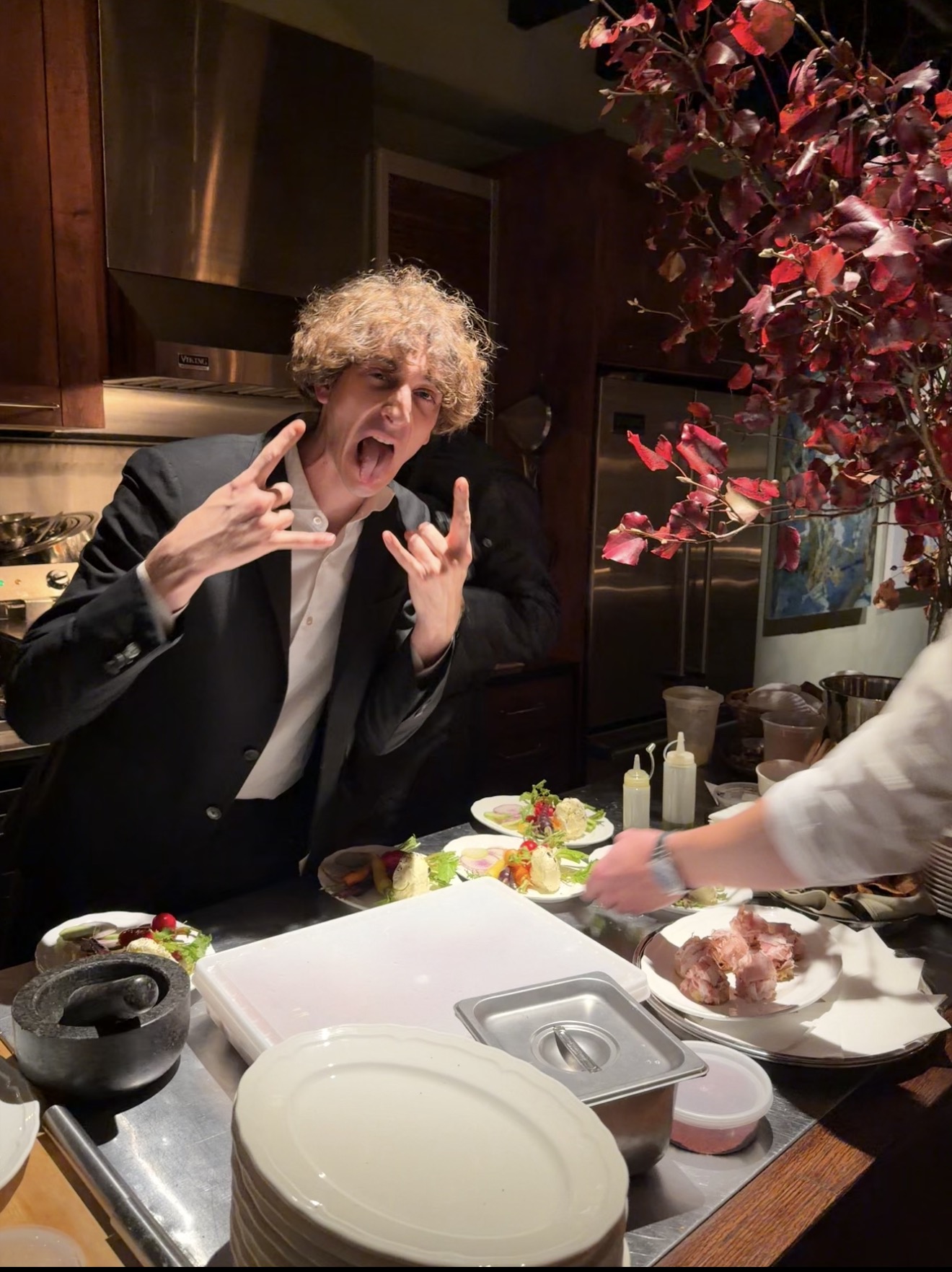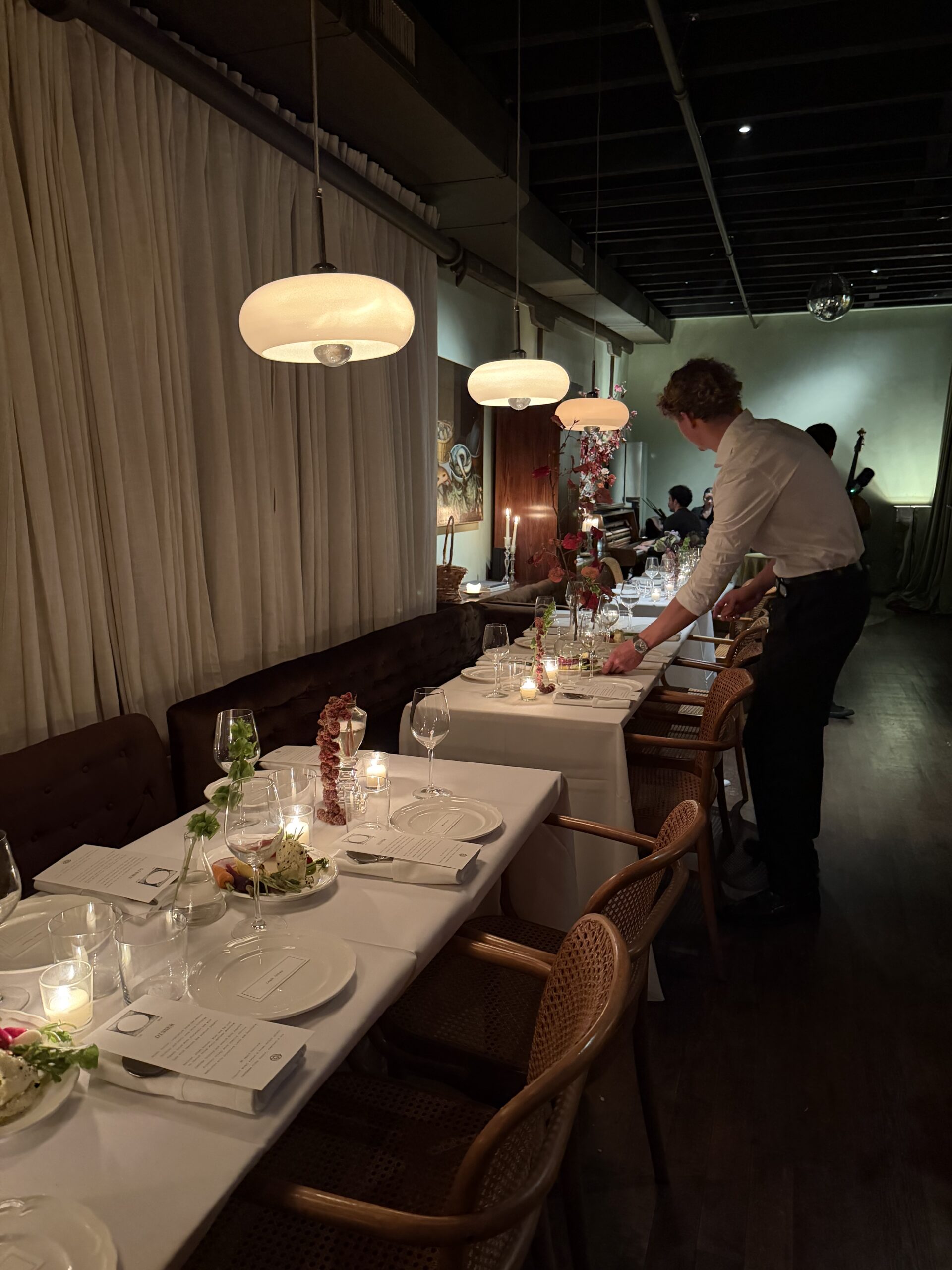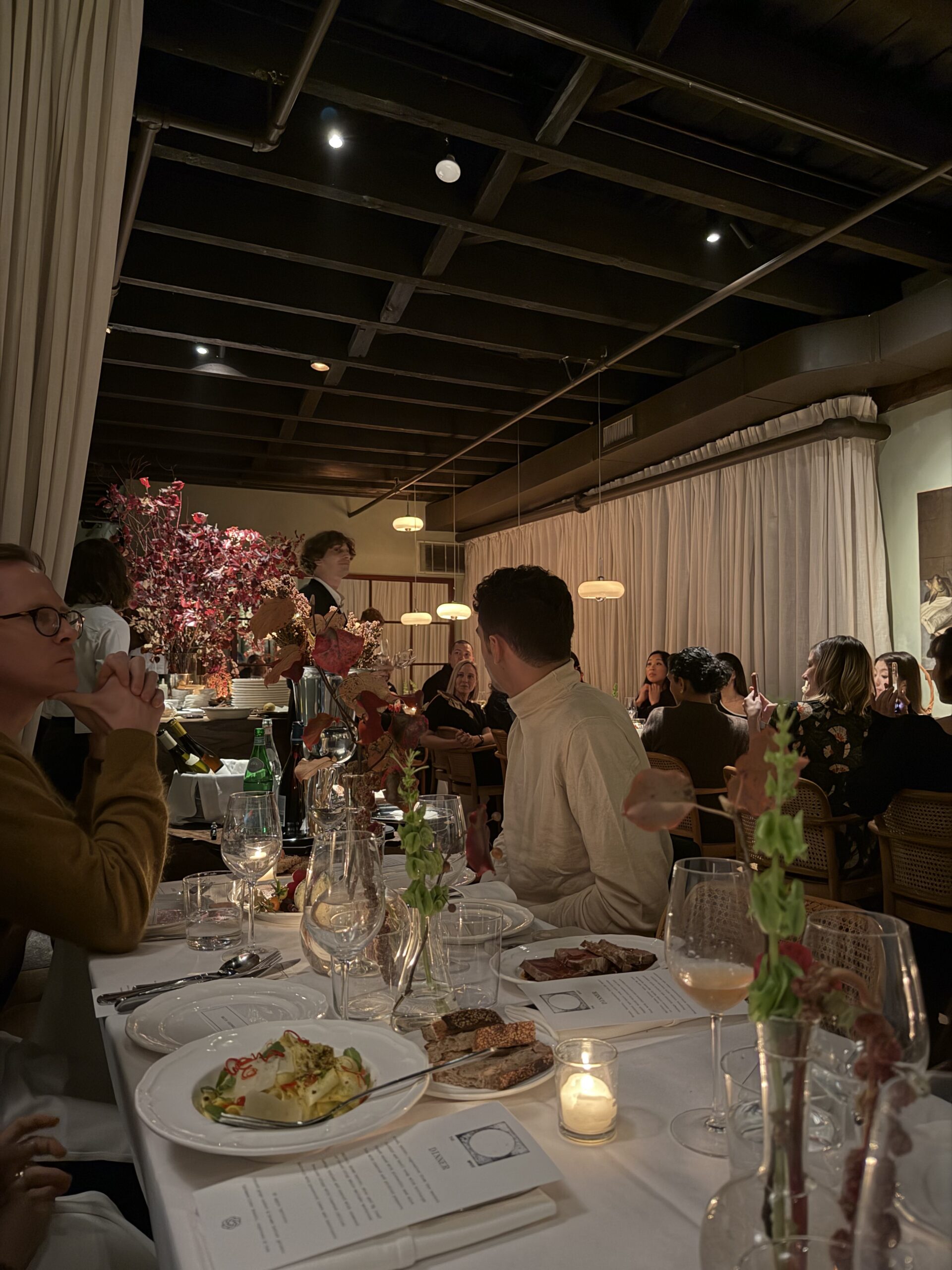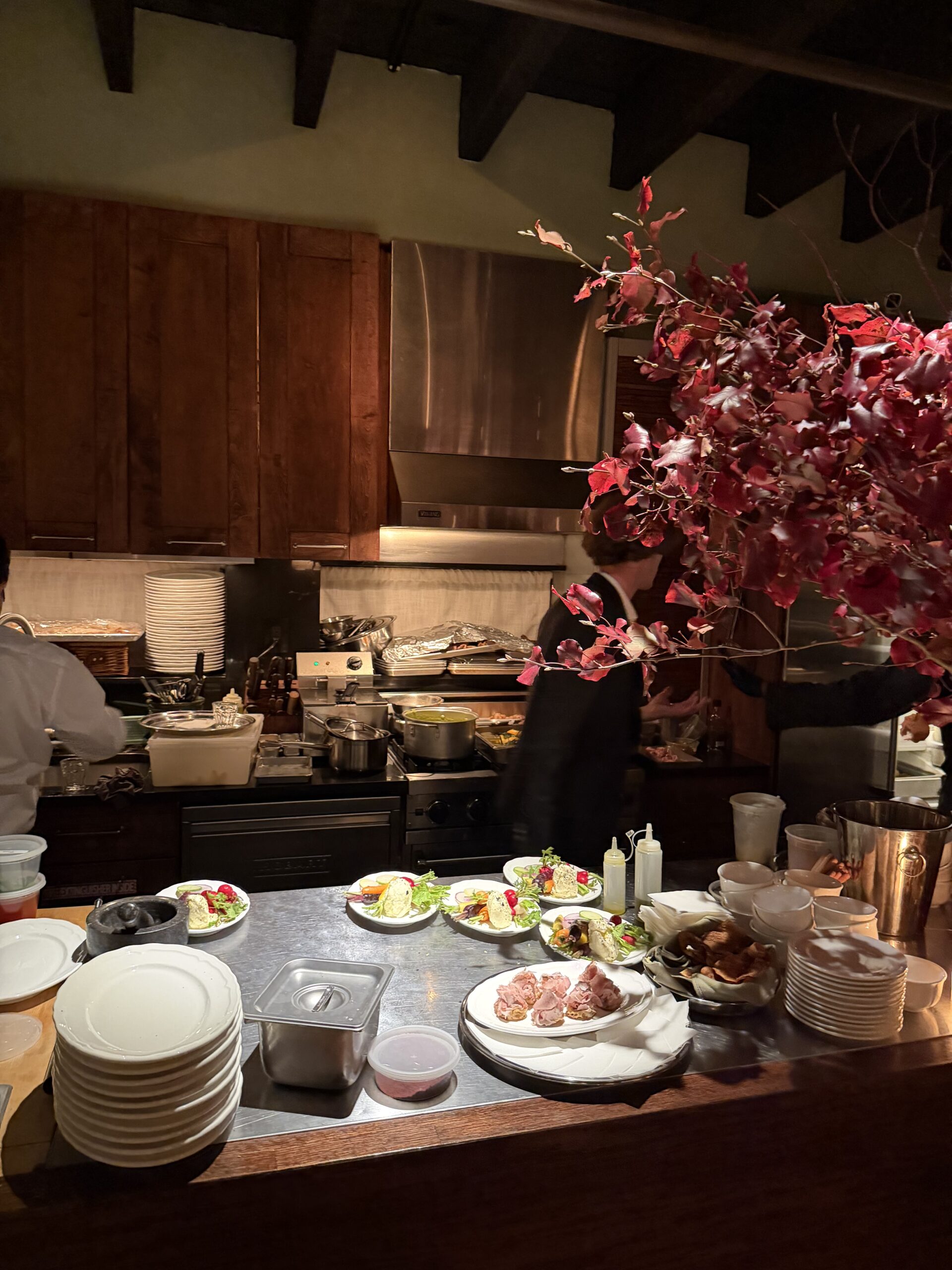NOM
Can ChapGPT Fix You Dinner? We Asked Celebrity Chef Jonah Reider.

WEDNESDAY 7:48 PM NOVEMBER 12, 2025 DOWNTOWN
A decade ago, kid-chef Jonah Reider became something of a culinary sensation when he opened New York’s most exclusive supper club, Pith, in his Columbia University dorm room. Lately, though, he’s proving he wasn’t just a flash in the pan. These days, the dorm has become The Spot, a loft-like private event space in Little Italy. On Wednesday evening, the now 31-year-old gourmand hosted an intimate dinner party to show off his latest culinary creations. The catch? Everything from the menu and the playlist to the wine pairings was powered by OpenAI. The only exception, of course, were Reider’s recipes—those require a human touch. “This is so cool to me,” he said while laying down his final garnishes, “but it’s not replacing anything we do here.” Before serving his guests dishes ranging from sea scallops soaked in green chili to triple-fried potato chips, Reider joined me to talk about how he’s bringing food into the future.
———
ARY RUSSELL: So walk me through what’s going on here.
JONAH REIDER: We are at The Spot, my venue for mysterious and beautiful private events.
RUSSELL: Lovely.
REIDER: We host all sorts of dinners and receptions for all sorts of clients, like individuals, companies, for a million different reasons, but people have cool events here. This one is in collaboration with OpenAI and ChatGPT. I use ChatGPT all the time, and I thought it was an interesting opportunity to explore how helpful and valuable these tools are for creative work without replacing the creative work itself. ChatGPT has not come up with the recipes or the menu per se, but it’s tech that I turn to all the time to make these things happen, and scheduling, who’s coming to help out with what, when and how are we ordering things. I’ve been chatting to Chat.

RUSSELL: Show me.
REIDER: Where I find it’s really helpful is in the kitchen. My sauce broke this afternoon and in the similar way that I would otherwise Google to see a bunch of different options, this is an arguably better solution for synthesizing information. This shit is my new control panel for the whole space that ChatGPT and I coded together, which is sick. I’m not a coder at all. Now we have a Raspberry Pi server in there and I changed over all the lights and music and everything, so now I can control the venue for events.
RUSSELL: The vibes are in the palm of your hand.
REIDER: Yeah. And there’s no screens here. I don’t like visible technology. I love using it, but in a really subtle, integrated way. Honestly, I’ve been using ChatGPT for a long time, and so it was interesting to apply it. It’s dope. I have it drafting answers to my emails.
RUSSELL: So it just cuts out the difficult parts of your life?
REIDER: In many ways, yeah. It has, in my experience, given me more time to be creative.
RUSSELL: So, what’s on the menu tonight?
REIDER: Now we’re getting into the good of it all. So we have an amazing, very light seasoned seafood menu this evening. I wanted to showcase these crazy wild plums and apple branches. These are baby crab apples and plums, so we’ll be using them also later in the day. We have some killer jazz this evening. We have live jazz most nights here where people can actually come hang out, enjoy the space and the music. We also have some cool guest chef series that we’re working on with chefs coming in to use the space.

RUSSELL: And you said the menu tonight is very seafood-centric, right?
REIDER: Oh, yeah. We have awesome shit. We have the fat-dry Montauk sea scallops every morning. Those are sliced thin, served in this kind of spicy, salty green-brown cucumber and green chili juice.
RUSSELL: I think I just tried that.
REIDER: We have these amazing fillets of halibut that are going to be cooking very slowly in olive oil and orange peels, and we’re serving that with cabbage, seaweed.
RUSSELL: I’ve seen things online about robot line cooks and the automation of the restaurant experience. How are you maintaining your creativity and personality as a restaurateur, as a chef, while also inviting technological advancement?
REIDER: I don’t support technology erasing the human labor that makes artistic work artistic, and I’m not a representative of OpenAI.
RUSSELL: Of course.

REIDER: Personally, I feel people who don’t embrace technological change will be left out of awesome things to come in the future. I’m relatively a technological optimist, but I think how you use tools is entirely up to you. I like to use artificial intelligence technology in ways that support my own creative pursuits and my own creative impulses.
RUSSELL: When I got the invite for this event, ChatGPT gave me little prompts like, “What are your favorite ingredients?” or “What song are you obsessed with?”
REIDER: Exactly. It’s invaluable for things like that. It’s threaded together, this playlist of songs that everyone wanted to listen to. This is so cool to me, but it’s not replacing anything that we do here. We don’t typically do that, but with a tool like this, we now can do that in no time on my team’s side.
RUSSELL: And that way, you can focus on the cooking.
REIDER: Hosting and the art of hosting is all about exceeding people’s expectations in these small little ways. And to the extent that I can use tech to do that, I will. It’s going to be really fun and I’m glad you get to see the space. I think it’s a cool example of using technology, because the space and the work that we do here is all about connecting people in real life to each other. To me, it’s a sign of a bad event if everyone is on their phones.






